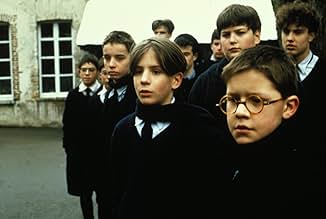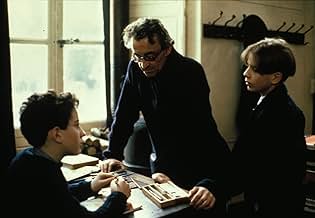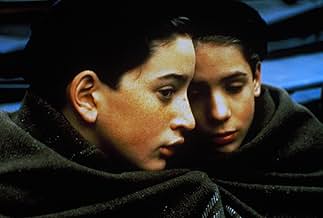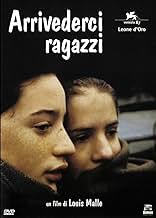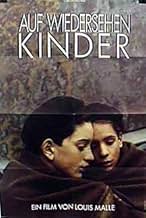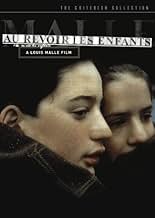CALIFICACIÓN DE IMDb
8.0/10
38 k
TU CALIFICACIÓN
Un internado liderado por sacerdotes durante la segunda guerra mundial parece ser un lugar seguro hasta la llegada de un nuevo alumno.Un internado liderado por sacerdotes durante la segunda guerra mundial parece ser un lugar seguro hasta la llegada de un nuevo alumno.Un internado liderado por sacerdotes durante la segunda guerra mundial parece ser un lugar seguro hasta la llegada de un nuevo alumno.
- Dirección
- Guionista
- Elenco
- Nominado a 2 premios Óscar
- 28 premios ganados y 12 nominaciones en total
Stanislas Carré de Malberg
- François Quentin
- (as Stanislas Carré De Malberg)
Luc Etienne
- Moreau
- (as Luc Étienne)
- Dirección
- Guionista
- Todo el elenco y el equipo
- Producción, taquilla y más en IMDbPro
Opiniones destacadas
Au Revoir Les Enfants (1987)
A wrenching, sensitive, all-too-true drama set in a gorgeous French wooded outpost during World War II. The main actors are boys, and they play their parts with unusual conviction, unexaggerated but with intensity. And the anti-Semitism that arises, though inevitable in Nazi territory, comes subtly and really stings. The movie isn't complete without this horror, but the horror is made complete by the really vivid recreation of this kind of private boys school--a period movie at its best.
Director Louis Malle has not only a message, but a sensitive feel for the medium--for making fluid the flow and background of the plots of his films. It's also a fairly complex mix of types, and you can somehow keep them all straight as it goes--as straight as you are meant to as the facts unfold. In the end, it confirms a familiar story of Nazi terror, but one that can't be told too often.
A wrenching, sensitive, all-too-true drama set in a gorgeous French wooded outpost during World War II. The main actors are boys, and they play their parts with unusual conviction, unexaggerated but with intensity. And the anti-Semitism that arises, though inevitable in Nazi territory, comes subtly and really stings. The movie isn't complete without this horror, but the horror is made complete by the really vivid recreation of this kind of private boys school--a period movie at its best.
Director Louis Malle has not only a message, but a sensitive feel for the medium--for making fluid the flow and background of the plots of his films. It's also a fairly complex mix of types, and you can somehow keep them all straight as it goes--as straight as you are meant to as the facts unfold. In the end, it confirms a familiar story of Nazi terror, but one that can't be told too often.
On seeing this movie several years ago my accompanying colleagues said of the film: what a load of self-indulgent, confusing, French stylized rubbish. They bemoaned the slow pace of the film, of the 2 dimensional directing and lack of any action or violent death scenes!
Those words still linger with me now and has made me realise that perhaps a lot of the movie-going public these days feed on the latest sfx pyrotechnics, more ingenious ways of abstract killings, lots of needless sex and not letting a good intelligent story get in the way.
Films like Les Enfants are going to be even more difficult to track down if Hollywood and some of the European studios opt for the fast Buck route to riches.
Les Enfant is a truly wonderful & yet harrowing account of life in a Catholic boys boarding school during the dying embers of the Nazi occupation of France in WW2. One of the new boys happens to be Jewish but the headmaster chooses to keep such identities covert while still offering him sanctuary and an education in spite of all the risks he takes.
To be fair I know little of Louis Malle previous to this film, but I think he must have poured his life's soul into writing & directing Les Enfant.
No detail, harrowing or otherwise, is spared; we see so much beauty amongst the horrors of occupation & collaboration; but also the blossoming relationship between the two lead boys and how initial envy & hatred of the Jew is somewhat diluted by the realities that this is no infantile school game but that life and death for the Jewish boy hangs by a thread if anyone at the school should reveal his true identity.
The final moments are perhaps one of the most sad & dramatic scenes I have ever seen. These days a lot of people would be waiting for some great heroic entrance from a big movie star to sort out all the misery and leave us with a reassurance that "it really wasn't all that bad back then was it".
But there are no heroes at the end of this movie, at least not the kind of heroes Hollywood serves up. The boys in this film are the true heroes right to the very end, primarily for their spirit of humanity in the face of impossible odds.
This is the hard reality of war amongst children growing up not only in the face of their own adolescence (and all the problems that serves), but also with the dark fingered claw of Nazism hanging menacingly like the the Scythe of the Grim Reaper.
This film will move you in so many directions and will hopefully bring you back down to earth from the current Hollywood shallow circus of pap & style-over-content.
Its a difficult film to track down, and the reason for this can be attributed to the first paragraph of this review.
*****/*****
Those words still linger with me now and has made me realise that perhaps a lot of the movie-going public these days feed on the latest sfx pyrotechnics, more ingenious ways of abstract killings, lots of needless sex and not letting a good intelligent story get in the way.
Films like Les Enfants are going to be even more difficult to track down if Hollywood and some of the European studios opt for the fast Buck route to riches.
Les Enfant is a truly wonderful & yet harrowing account of life in a Catholic boys boarding school during the dying embers of the Nazi occupation of France in WW2. One of the new boys happens to be Jewish but the headmaster chooses to keep such identities covert while still offering him sanctuary and an education in spite of all the risks he takes.
To be fair I know little of Louis Malle previous to this film, but I think he must have poured his life's soul into writing & directing Les Enfant.
No detail, harrowing or otherwise, is spared; we see so much beauty amongst the horrors of occupation & collaboration; but also the blossoming relationship between the two lead boys and how initial envy & hatred of the Jew is somewhat diluted by the realities that this is no infantile school game but that life and death for the Jewish boy hangs by a thread if anyone at the school should reveal his true identity.
The final moments are perhaps one of the most sad & dramatic scenes I have ever seen. These days a lot of people would be waiting for some great heroic entrance from a big movie star to sort out all the misery and leave us with a reassurance that "it really wasn't all that bad back then was it".
But there are no heroes at the end of this movie, at least not the kind of heroes Hollywood serves up. The boys in this film are the true heroes right to the very end, primarily for their spirit of humanity in the face of impossible odds.
This is the hard reality of war amongst children growing up not only in the face of their own adolescence (and all the problems that serves), but also with the dark fingered claw of Nazism hanging menacingly like the the Scythe of the Grim Reaper.
This film will move you in so many directions and will hopefully bring you back down to earth from the current Hollywood shallow circus of pap & style-over-content.
Its a difficult film to track down, and the reason for this can be attributed to the first paragraph of this review.
*****/*****
This is a very moving film, most likely based on an actual event. The Carmelite priest,Lucien Bunel (1900-1945, "Pere Jacques") was founder and director of the Petit College d'Avon, near Fontainebleau. He was arrested on Jan. 15, 1994, accused of hiding 3 Jewish boys among his students, and was deported to the infamous Mauthausen concentration camp. He died in Linz, Austria on June 2, 1945. Malle's film depicts the intense trauma of Jewish children who were separated from their families and forced to take on a new identity in hiding, always afraid of being found out. They also faced the dilemma of how to maintain their Jewishness in the setting of a Catholic school. So, not just another war movie, this film depicts some of the real struggles facing hidden children, many of whom were saved by courageous Christians in Europe.
10Sloke
The movie was a project close to Louis Malle's heart (he was in tears when the film premiered at a film festival in 1987) and it shows in the multi-layered treatment he gives the central setting, this fascinating boarding school with its broad cast of characters. Because there are so many different strands and affecting moments tangential to the central plot, one is not entirely prepared for the finale even if you are expecting it. French film is characteristically digressive, often to a fault, but here it works to splendid advantage. It also lends itself to repeat viewings.
I don't think you need to have lived in occupied Europe to appreciate this wonderful film; it speaks to all of us who have lived through childhood's quickly-passing parade and know its lifelong regrets. That last image of the stone wall is emblazoned in many consciousnesses, as it is in mine.
There are many interesting choices Malle makes in this film. For example, while the central subject is the Holocaust, nearly all the Germans we actually see in the film are fairly decent if nonetheless menacing types. The real villains here are almost entirely French collaborators, which was done I think to call attention to collaboration during a period when the French were dealing with the Klaus Barbie trial. [Barbie was a Gestapo officer who was aided in his work rooting out Resistance leaders by many French collaborators.] But casting French people as the heavies also suggests the central evil of prejudice and oppression is not something exclusive to one nationality, and it broadens the scope of the movie.
The tender treatment Malle affords the Catholic hierarchy in the movie is unusual, too, when you see other more anti-clerical Malle efforts like "Murmur of the Heart." There is an unexpected sense of spirituality throughout this film, somewhat muted but there all the same.
This may well stand as the cinematic masterpiece of a man who, at his best (see also "Atlantic City" and "My Dinner With Andre") was to motion pictures what his countrymen Zola and Hugo were to novels: An artist who filled his canvas with the verve and breadth of human life.
I don't think you need to have lived in occupied Europe to appreciate this wonderful film; it speaks to all of us who have lived through childhood's quickly-passing parade and know its lifelong regrets. That last image of the stone wall is emblazoned in many consciousnesses, as it is in mine.
There are many interesting choices Malle makes in this film. For example, while the central subject is the Holocaust, nearly all the Germans we actually see in the film are fairly decent if nonetheless menacing types. The real villains here are almost entirely French collaborators, which was done I think to call attention to collaboration during a period when the French were dealing with the Klaus Barbie trial. [Barbie was a Gestapo officer who was aided in his work rooting out Resistance leaders by many French collaborators.] But casting French people as the heavies also suggests the central evil of prejudice and oppression is not something exclusive to one nationality, and it broadens the scope of the movie.
The tender treatment Malle affords the Catholic hierarchy in the movie is unusual, too, when you see other more anti-clerical Malle efforts like "Murmur of the Heart." There is an unexpected sense of spirituality throughout this film, somewhat muted but there all the same.
This may well stand as the cinematic masterpiece of a man who, at his best (see also "Atlantic City" and "My Dinner With Andre") was to motion pictures what his countrymen Zola and Hugo were to novels: An artist who filled his canvas with the verve and breadth of human life.
This movies is one of those movies that you can love, but hate. It makes you hate what happens in the movie. You get so attached to the characters, and when things happen to them, you hate it. But the movie is powerful, wonderfully written and directed by Louis Malle and defiantly should be seen anytime one is studying WWII or the Holocost, or if you have free time, and are looking for a good heart-wrencher. I watched it in French, with subtitles, and that makes it all the better.
¿Sabías que…?
- TriviaBased on an incident from Louis Malle's own youth. Julien is modeled after Malle.
- ErroresWhen hiking, Julien asks what day it is and is told that it's Thursday, January 17th, 1944. That date was actually a Monday.
- Créditos curiososPour Cuotemoc, Justine et Chloé. (opening credits)
Selecciones populares
Inicia sesión para calificar y agrega a la lista de videos para obtener recomendaciones personalizadas
- How long is Au Revoir les Enfants?Con tecnología de Alexa
Detalles
- Fecha de lanzamiento
- Países de origen
- Sitio oficial
- Idiomas
- También se conoce como
- Au Revoir les Enfants
- Locaciones de filmación
- Productoras
- Ver más créditos de la compañía en IMDbPro
Taquilla
- Total en EE. UU. y Canadá
- USD 4,542,825
- Total a nivel mundial
- USD 4,575,613
- Tiempo de ejecución
- 1h 44min(104 min)
- Color
- Mezcla de sonido
- Relación de aspecto
- 1.66 : 1
Contribuir a esta página
Sugiere una edición o agrega el contenido que falta

![Ver Bande-annonce [VOST]](https://m.media-amazon.com/images/M/MV5BZDlkMTI5OTgtNmU4My00MzRjLWFkNzMtYmMyMDlhNjQ2OTFmXkEyXkFqcGdeQXRyYW5zY29kZS13b3JrZmxvdw@@._V1_QL75_UX500_CR0)
